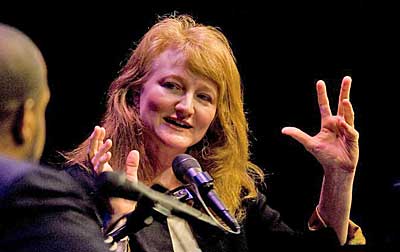Tippett and company opted for a program name that would be more "welcoming" than Speaking of Faith. (Photo: Ann Marsden, APM.)
‘Faith’ in program title limited the audience, Tippett found
When Krista Tippett realized nearly two years ago that she wanted to change the name of her public radio series, she was vacationing in a cabin in northern Minnesota. It was December 2008 and dead cold outside —20 degrees below zero. The only heat came from a wood stove.
Speaking of Faith, her weekly APM show, distributed weekly since 2003, had achieved two major milestones by winning a 2008 Peabody Award and passing the audience milestone of 500,000 listeners. But Tippett was “completely worn out” by work and retreated to the shore of Lake Superior to collect herself.
Tippett worried that the show title Speaking of Faith “wasn’t big enough” to reflect the range of weighty questions the program was asking, she told Current. People assumed a program with “Faith” in its title would be restricted to religion or even to Christianity. A new title would help listeners spread the word to a much bigger potential audience, including people “who may be turned off by the name.”
Her colleagues initially opposed changing the title as the show was gaining accolades and recognition, but marketers agreed that it was a barrier. “We realized, why should we struggle with a name that works against us . . . ,” she said.
An APM survey of current and potential listeners later found “negligible risk in changing the name and a big opportunity if it had a different name,” said Kate Moos, producer. APM hired a branding firm, Minneapolis-based Ginger, to guide decisions about the new title. Once the choices were narrowed down, “we spent a week putting it under our pillows at night, and each of us arrived independently at Being.”
In September the show changed its name to Krista Tippett on Being.
There won’t be a change in the program’s editorial approach: the re-branding reflects a shift that already happened, Tippett said Sept. 25 at the Public Radio Program Directors conference in Denver. When it launched as Speaking of Faith, the show paid a lot of attention to defusing the tensions between Islam and evangelical Christianity in public dialogue, she said. Its editorial lens has widened from there.
“In 2010, there’s a readiness to have great, big searching conversations about big issues” among those whose beliefs as atheists, devout Christians or secular feminists frame their identities.
“That is the shape of the future — being more hospitable so that people feel more welcomed to the conversation.”
Web page posted Oct. 6, 2010
Copyright 2010 by Current LLC
